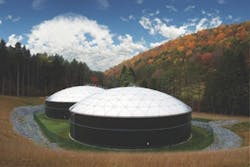Glass-Fused-to-Steel Storage Tanks Offer Long Lifetime and Value
There are multiple advantages in using glass-fused-to-steel tanks for the storage of potable water, corrosive and other liquid applications. In addition to ease of assembly, they have greater lifetime value, far lower maintenance costs and little environmental impact compared with other liquid storage structures.
Initially developed as a proprietary process for fusing glass to steel for the manufacture of large, single-piece, glass-lined brewery tanks and, later, glass-lined hot water heaters, glass-fused-to-steel first went into service in tank form in the 1940s as feed storage silos. While many are still used for agricultural purposes, these tanks have predominately been used for water, wastewater and other liquid storage uses since the 1970s.
The physical properties of glass coating are especially suited to municipal and industrial storage applications because they form a hard, inert, inorganic barrier for both the interior and exterior tank surfaces and guard against weather and corrosion. Porcelain enamel is fused to steel at 1500°F, creating the strongest bond possible between coating and steel. As a direct result of fusing glass to steel, the glass coating is impermeable to liquids and vapors, controls undercutting caused by corrosion and offers substantial impact and abrasion resistance.
Glass-fused-to-steel tanks require the lowest maintenance over the life of the tank compared to other storage structures, and they have an allowable service range of 140°F at 3 to 11 pH.
Glass-fused-to-steel meets and exceeds a wide range of standards, including AWWA D103—Bolted Steel Water Storage Tanks, AISC, IBC, NBCC, FM and NFPA Standard 22.
Contact Us
CST Storage/Aquastore
DeKalb, IL
815.756.1551
www.aquastore.com
